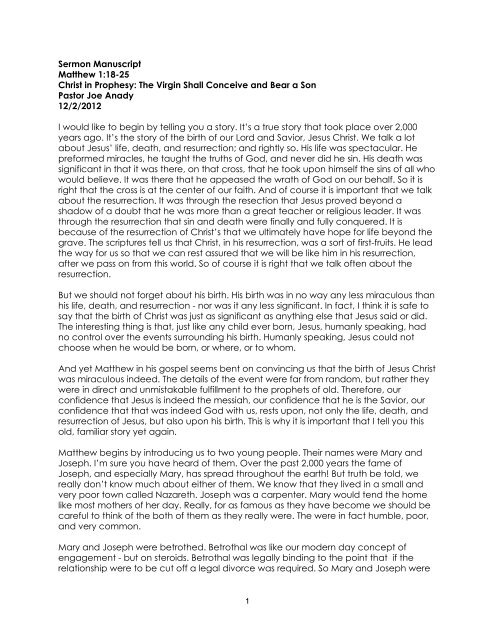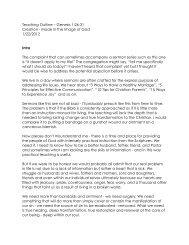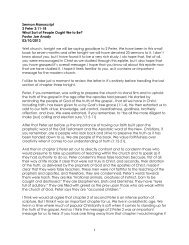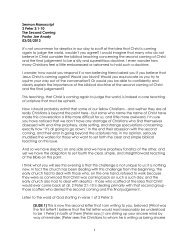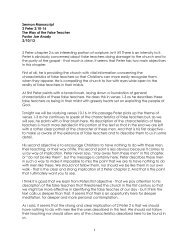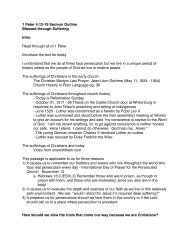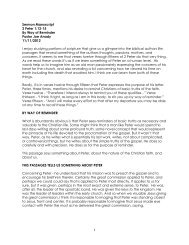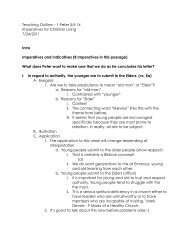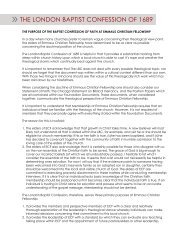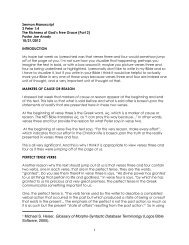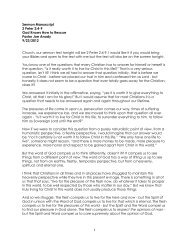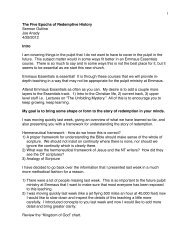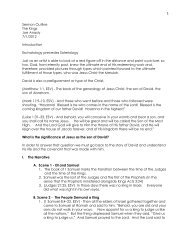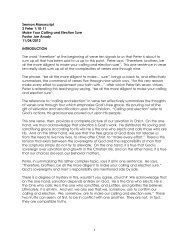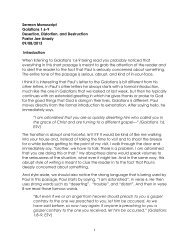Sermon Manuscript Matthew 1:18-25 Christ in Prophesy: The Virgin ...
Sermon Manuscript Matthew 1:18-25 Christ in Prophesy: The Virgin ...
Sermon Manuscript Matthew 1:18-25 Christ in Prophesy: The Virgin ...
You also want an ePaper? Increase the reach of your titles
YUMPU automatically turns print PDFs into web optimized ePapers that Google loves.
<strong>Sermon</strong> <strong>Manuscript</strong><br />
<strong>Matthew</strong> 1:<strong>18</strong>-<strong>25</strong><br />
<strong>Christ</strong> <strong>in</strong> <strong>Prophesy</strong>: <strong>The</strong> Virg<strong>in</strong> Shall Conceive and Bear a Son<br />
Pastor Joe Anady<br />
12/2/2012<br />
I would like to beg<strong>in</strong> by tell<strong>in</strong>g you a story. It’s a true story that took place over 2,000<br />
years ago. It’s the story of the birth of our Lord and Savior, Jesus <strong>Christ</strong>. We talk a lot<br />
about Jesus’ life, death, and resurrection; and rightly so. His life was spectacular. He<br />
preformed miracles, he taught the truths of God, and never did he s<strong>in</strong>. His death was<br />
significant <strong>in</strong> that it was there, on that cross, that he took upon himself the s<strong>in</strong>s of all who<br />
would believe. It was there that he appeased the wrath of God on our behalf. So it is<br />
right that the cross is at the center of our faith. And of course it is important that we talk<br />
about the resurrection. It was through the resection that Jesus proved beyond a<br />
shadow of a doubt that he was more than a great teacher or religious leader. It was<br />
through the resurrection that s<strong>in</strong> and death were f<strong>in</strong>ally and fully conquered. It is<br />
because of the resurrection of <strong>Christ</strong>’s that we ultimately have hope for life beyond the<br />
grave. <strong>The</strong> scriptures tell us that <strong>Christ</strong>, <strong>in</strong> his resurrection, was a sort of first-fruits. He lead<br />
the way for us so that we can rest assured that we will be like him <strong>in</strong> his resurrection,<br />
after we pass on from this world. So of course it is right that we talk often about the<br />
resurrection.<br />
But we should not forget about his birth. His birth was <strong>in</strong> no way any less miraculous than<br />
his life, death, and resurrection - nor was it any less significant. In fact, I th<strong>in</strong>k it is safe to<br />
say that the birth of <strong>Christ</strong> was just as significant as anyth<strong>in</strong>g else that Jesus said or did.<br />
<strong>The</strong> <strong>in</strong>terest<strong>in</strong>g th<strong>in</strong>g is that, just like any child ever born, Jesus, humanly speak<strong>in</strong>g, had<br />
no control over the events surround<strong>in</strong>g his birth. Humanly speak<strong>in</strong>g, Jesus could not<br />
choose when he would be born, or where, or to whom.<br />
And yet <strong>Matthew</strong> <strong>in</strong> his gospel seems bent on conv<strong>in</strong>c<strong>in</strong>g us that the birth of Jesus <strong>Christ</strong><br />
was miraculous <strong>in</strong>deed. <strong>The</strong> details of the event were far from random, but rather they<br />
were <strong>in</strong> direct and unmistakable fulfillment to the prophets of old. <strong>The</strong>refore, our<br />
confidence that Jesus is <strong>in</strong>deed the messiah, our confidence that he is the Savior, our<br />
confidence that that was <strong>in</strong>deed God with us, rests upon, not only the life, death, and<br />
resurrection of Jesus, but also upon his birth. This is why it is important that I tell you this<br />
old, familiar story yet aga<strong>in</strong>.<br />
<strong>Matthew</strong> beg<strong>in</strong>s by <strong>in</strong>troduc<strong>in</strong>g us to two young people. <strong>The</strong>ir names were Mary and<br />
Joseph. I’m sure you have heard of them. Over the past 2,000 years the fame of<br />
Joseph, and especially Mary, has spread throughout the earth! But truth be told, we<br />
really don’t know much about either of them. We know that they lived <strong>in</strong> a small and<br />
very poor town called Nazareth. Joseph was a carpenter. Mary would tend the home<br />
like most mothers of her day. Really, for as famous as they have become we should be<br />
careful to th<strong>in</strong>k of the both of them as they really were. <strong>The</strong> were <strong>in</strong> fact humble, poor,<br />
and very common.<br />
Mary and Joseph were betrothed. Betrothal was like our modern day concept of<br />
engagement - but on steroids. Betrothal was legally b<strong>in</strong>d<strong>in</strong>g to the po<strong>in</strong>t that if the<br />
relationship were to be cut off a legal divorce was required. So Mary and Joseph were<br />
1
very serious about prepar<strong>in</strong>g for marriage. Joseph was gett<strong>in</strong>g his house <strong>in</strong> order and<br />
Mary was prepar<strong>in</strong>g herself to be a wife, all under the watchful eye of the community.<br />
You should know that Joseph was probably under <strong>18</strong> years old and Mary was perhaps<br />
as young as 14. Times were obviously different back then. Girls and boys grew up faster;<br />
they had more responsibilities given to them at a younger age and they were ready for<br />
marriage by this time <strong>in</strong> their lives.<br />
So when you picture Mary and Joseph you should picture two very young, poor, and<br />
humble people. <strong>The</strong> scriptures tell us that Joseph was a righteous man. He lived <strong>in</strong> a<br />
way that was pleas<strong>in</strong>g to God. He had <strong>in</strong>tegrity. Mary must have been a very strong<br />
and mature young lady as well. We know this because of the trial that she would<br />
eventually endure and the honorable way <strong>in</strong> which she endured it. She had<br />
tremendous faith <strong>in</strong> God, that much is sure.<br />
In the process of time someth<strong>in</strong>g very out of the ord<strong>in</strong>ary happened to these two. When<br />
they were <strong>in</strong> their betrothal period, before they lived together, and before they were<br />
officially married, Mary found out that she was pregnant.<br />
Now as you could imag<strong>in</strong>e this created some tension. Mary, as we now know, had<br />
received a vision that the child grow<strong>in</strong>g with<strong>in</strong> her was of the Holy Spirit. She had been<br />
faithful to Joseph, and she told him so.<br />
But I want you to put yourself <strong>in</strong> Joseph’s position for just a moment. Joseph had not<br />
received such a vision. He was listen<strong>in</strong>g to his betrothed wife and the story that she was<br />
tell<strong>in</strong>g him. She was <strong>in</strong>sist<strong>in</strong>g that she has been faithful to him. She <strong>in</strong>sisted that she had<br />
received a vision from the Lord and that the child grow<strong>in</strong>g <strong>in</strong>side of her was of the Holy<br />
Spirit.<br />
I would imag<strong>in</strong>e that all of us can understand why Joseph was <strong>in</strong>itially hesitant to<br />
receive all of this as true. This story, after all, when considered from a purely human<br />
perspective, is rather unbelievable.<br />
Joseph was confounded. I would imag<strong>in</strong>e that he had about a thousand thoughts<br />
runn<strong>in</strong>g through his head all at once as he considered what was happen<strong>in</strong>g. I’m sure<br />
he was ask<strong>in</strong>g himself, “Is it possible that Mary is tell<strong>in</strong>g me truth?”, “how can a virg<strong>in</strong> be<br />
with child?”, “or was she unfaithful to me, and with whom?”, and “what would my<br />
friends and family th<strong>in</strong>k if I kept her as my wife?” I would imag<strong>in</strong>e that Joseph lost plenty<br />
of sleep over this. I would assume that his stomach was <strong>in</strong> knots, and his m<strong>in</strong>d foggy as<br />
tried to make sense of it all.<br />
His human <strong>in</strong>tuition was tell<strong>in</strong>g him that it was time to call off the marriage and to end<br />
the betrothal period through divorce. Because Joseph was a righteous man he<br />
<strong>in</strong>tended to do so <strong>in</strong> a quite way so as to not put Mary to shame. I th<strong>in</strong>k most of us<br />
would have probably came to the same conclusions if we were <strong>in</strong> Joseph’s place.<br />
But it was <strong>in</strong> that moment that God <strong>in</strong>tervened <strong>in</strong> a miraculous way. <strong>The</strong> Angel of the<br />
Lord appeared to Joseph <strong>in</strong> a dream as he slept, say<strong>in</strong>g,<br />
2
“Joseph, son of David, do not fear to take Mary as your wife, for that which is<br />
conceived <strong>in</strong> her is from the Holy Spirit. She will bear a son and you shall call his<br />
name Jesus, for he will save his people from their s<strong>in</strong>s.”<br />
Of course everyth<strong>in</strong>g changed for Joseph <strong>in</strong> that moment. He went from be<strong>in</strong>g a<br />
humble, poor, desperately confused and heartbroken young man to be<strong>in</strong>g the direct<br />
recipient of the most significant news <strong>in</strong> the history of redemption up to that po<strong>in</strong>t.<br />
Certa<strong>in</strong>ly Joseph understood from his study of scripture that when the Angel of the Lord<br />
appeared someth<strong>in</strong>g significant was about to happen. For example, <strong>The</strong> Angel of the<br />
Lord had appeared to Abraham when he was about to sacrifice Isaac so that a<br />
substitute could be provided for his one and only Son through whom the messiah would<br />
come. <strong>The</strong> Angel of the Lord had appeared to Moses <strong>in</strong> the burn<strong>in</strong>g bush when God<br />
called him to deliver the people of God from their bondage <strong>in</strong> Egypt. And now the<br />
Angel of the Lord stood before him and announced someth<strong>in</strong>g that was greater than<br />
any announcement given to anyone ever before.<br />
Evidentially this vision was effective. Joseph changed his m<strong>in</strong>d concern<strong>in</strong>g divorce and<br />
took Mary as his wife. He did so at a great cost to himself. He was shunned by his<br />
community and faced challenges of many k<strong>in</strong>ds for the rest of his life, but he was<br />
faithful to what the Lord had called him to. He did not know Mary until the child was<br />
born. And he called his name Jesus <strong>in</strong> obedience the word of the Lord.<br />
This story comes from <strong>Matthew</strong> 1:<strong>18</strong>-<strong>25</strong>. Please turn there as we ask the question, “what<br />
is the po<strong>in</strong>t of this story.” We are mistaken if we th<strong>in</strong>k that <strong>Matthew</strong> just liked to tell<br />
stories. <strong>The</strong> truth is that he, through the <strong>in</strong>spiration of the Holy Spirit, had an agenda. He<br />
had a po<strong>in</strong>t to make. It is our aim to understand what that po<strong>in</strong>t is.<br />
<strong>The</strong> po<strong>in</strong>t that <strong>Matthew</strong> is mak<strong>in</strong>g is that Jesus is the <strong>Christ</strong>; he is the Messiah, the<br />
Ano<strong>in</strong>ted One of God. <strong>Matthew</strong> wants us to know, through the tell<strong>in</strong>g of the events<br />
surround<strong>in</strong>g Jesus’ birth, that this Jesus is the One to whom all of the Old Testament<br />
scriptures po<strong>in</strong>t. He wants us to be sure, beyond a shadow of doubt, that Jesus <strong>Christ</strong> is<br />
the Savior, God <strong>in</strong>carnate, the most significant figure <strong>in</strong> human history, the p<strong>in</strong>nacle of<br />
God’s plan of redemption.<br />
<strong>Matthew</strong> makes his po<strong>in</strong>t <strong>in</strong> at least three ways <strong>in</strong> this short passage. I will briefly touch<br />
on two and then spend more time on the third, as I th<strong>in</strong>k it is most significant.<br />
First of all, <strong>Matthew</strong> supports the truth that Jesus is the Messiah by emphasiz<strong>in</strong>g that<br />
Joseph, and therefore, Jesus are <strong>in</strong> the l<strong>in</strong>age of David.<br />
When Joseph is <strong>in</strong> angst concern<strong>in</strong>g what to do with Mary, <strong>Matthew</strong> tells us that the<br />
Angel of the Lord called out to him He say<strong>in</strong>g, “Joseph, Son of David, do not fear to<br />
take Mary as your wife.” This may seem <strong>in</strong>significant at first but I th<strong>in</strong>k it is of great<br />
significance that <strong>The</strong> Angel of the Lord calls Joseph, “Joseph, son of David.”<br />
Every Jewish person on the planet, of whom Joseph was one, knew that the Messiah,<br />
the ano<strong>in</strong>ted one of God, the savior, would have to come through the l<strong>in</strong>e of David<br />
accord<strong>in</strong>g to the scriptures. He could not come any other way. And so when <strong>Matthew</strong><br />
3
tells us that Joseph was called, “Joseph, son of David”, that should be a clue, a flash<strong>in</strong>g<br />
red light, someth<strong>in</strong>g obviously po<strong>in</strong>t<strong>in</strong>g to the fact that all of these miraculous events<br />
are happ<strong>in</strong>g <strong>in</strong> fulfillment to the promise made to K<strong>in</strong>g David a thousand years before.<br />
In 2 Samuel 7:12-14, 16 we are told that the prophet Nathan spoke to K<strong>in</strong>g David the<br />
word of the Lord, say<strong>in</strong>g,<br />
“When your days are fulfilled and you lie down with your fathers, I will raise up<br />
your offspr<strong>in</strong>g after you, who shall come from your body, and I will establish his<br />
k<strong>in</strong>gdom. He shall build a house for my name, and I will establish the throne of his<br />
k<strong>in</strong>gdom forever. I will be to him a father, and he shall be to me a son... And your<br />
house and your k<strong>in</strong>gdom shall be made sure forever before me. Your throne shall<br />
be established forever.” (2 Samuel 7:12-14a, 16, ESV)<br />
And now <strong>Matthew</strong>, writ<strong>in</strong>g over a thousand years later, wants us to understand that<br />
Jesus is the <strong>Christ</strong> com<strong>in</strong>g <strong>in</strong> fulfillment to that promise. Jesus is the K<strong>in</strong>g who will reign for<br />
ever <strong>in</strong> the l<strong>in</strong>e of David.<br />
This po<strong>in</strong>t only becomes more obvious as we consider the context <strong>in</strong> <strong>Matthew</strong>. We<br />
picked up <strong>in</strong> verse <strong>18</strong> this even<strong>in</strong>g but we skipped right over a very significant<br />
genealogy <strong>in</strong> verse 1-17. I won’t read the who th<strong>in</strong>g, but I want you to notice that David<br />
is clearly emphasized.<br />
Verse 1:<br />
Verse 17:<br />
<strong>The</strong> book of the genealogy of Jesus <strong>Christ</strong>, the son of David, the son of Abraham.<br />
(<strong>Matthew</strong> 1:1, ESV)<br />
So all the generations from Abraham to David were fourteen generations, and from<br />
David to the deportation to Babylon fourteen generations, and from the deportation to<br />
Babylon to the <strong>Christ</strong> fourteen generations. (<strong>Matthew</strong> 1:17, ESV)<br />
Clearly <strong>Matthew</strong> is pick<strong>in</strong>g up on this very important theme when he tells us that the<br />
Angel of the Lord referred to Joseph as “Joseph, son of David.” Jesus, then, is <strong>in</strong> the<br />
proper l<strong>in</strong>eage to <strong>in</strong> fact be the Messiah. I believe the Angel of the Lord spoke this way<br />
to Joseph as a way of encourag<strong>in</strong>g his heart that what was happen<strong>in</strong>g was <strong>in</strong>deed<br />
accord<strong>in</strong>g to the scriptures,<br />
More could be said but I will move on to the second <strong>in</strong>dication <strong>in</strong> this passage that<br />
Jesus is the <strong>Christ</strong>.<br />
I would also like to draw your attention to the significance of Jesus’ name.<br />
Joseph is specifically told to name the baby, Jesus. Look with me <strong>in</strong> verse 21:<br />
She will bear a son, and you shall call his name Jesus, for he will save his people<br />
from their s<strong>in</strong>s.” (<strong>Matthew</strong> 1:21, ESV)<br />
4
<strong>The</strong> name Jesus is the Greek translation of the Hebrew name, Joshua which means,<br />
“whose help is the Lord” or, “the one whose salvation is the Lord”. If you remember<br />
back to our sermon series through the Bible you will remember that Joshua was a very<br />
significant character. He was the one who lead the people of God <strong>in</strong>to the Promise<br />
Land. He was the mighty conquerer, the delivered, the Savior.<br />
And given the way that the New Testament looks back on the Old it is right to<br />
understand that the conquests of Joshua, though they were real and significant <strong>in</strong> and<br />
of themselves, they were a picture of the true salvation that was yet to come. Joshua<br />
was a savior, but a greater savior was on the way. Joshua conquered, but a greater<br />
conquest was com<strong>in</strong>g. Joshua established a k<strong>in</strong>gdom and earned a land, but the<br />
k<strong>in</strong>gdom and the land were po<strong>in</strong>t<strong>in</strong>g forward to someone and someth<strong>in</strong>g greater,<br />
namely Jesus <strong>Christ</strong> and his k<strong>in</strong>gdom which has no boundaries and will have no end.<br />
Notice that the Angel of the Lord actually told Joseph why the baby was to be named<br />
Jesus. Look aga<strong>in</strong> at verse 21:<br />
“You shall call his name Jesus, for... he will save his people from their s<strong>in</strong>s.”<br />
Joshua saved the people <strong>in</strong> one way, Jesus would provide salvation of another sort. <strong>The</strong><br />
salvation that Jesus would provide would not be earthly or political, but spiritual and<br />
eternal. Jesus, the Angel says to Joseph, would save his from their s<strong>in</strong>s.<br />
It’s true that many people were named Jesus <strong>in</strong> that day. Be<strong>in</strong>g named Jesus was no<br />
guarantee that someone was the Messiah, nor was the name used to claim<br />
Messiahship. <strong>The</strong> po<strong>in</strong>t I am mak<strong>in</strong>g is that given all of the circumstances surround<strong>in</strong>g<br />
the birth of <strong>Christ</strong>, the fact that he is named Jesus po<strong>in</strong>ts us to the reality that he is<br />
<strong>in</strong>deed the savior, the mighty conquer, the one to establish an everlast<strong>in</strong>g k<strong>in</strong>gdom <strong>in</strong> a<br />
much greater way than Joshua ever did over a thousand years before. Joshua and the<br />
land were types and shadows, Jesus was the substance.<br />
<strong>The</strong> first two po<strong>in</strong>ts that <strong>Matthew</strong> makes <strong>in</strong> support of Jesus be<strong>in</strong>g the messiah are<br />
admittedly f<strong>in</strong>e po<strong>in</strong>ts. <strong>The</strong> third po<strong>in</strong>t is the major one because it is the po<strong>in</strong>t that<br />
<strong>Matthew</strong> emphasizes.<br />
It’s <strong>in</strong>terest<strong>in</strong>g that <strong>in</strong> verses <strong>18</strong>-<strong>25</strong> <strong>Matthew</strong>s is, for the most part, tell<strong>in</strong>g a story. It is<br />
narrative. But <strong>in</strong> verse 22 and 23 there is break <strong>in</strong> the middle of the story as <strong>Matthew</strong><br />
adds some commentary of his own. He expla<strong>in</strong>s,<br />
“All this took place to fulfill what the Lord had spoken by the prophet...”<br />
This is <strong>in</strong> fact my third po<strong>in</strong>t, and the ma<strong>in</strong> one:<br />
Not only is the fact that Jesus is the Messiah, the Savior, and God with us supported by<br />
his l<strong>in</strong>eage - he came <strong>in</strong> the l<strong>in</strong>e of David, and through the giv<strong>in</strong>g of his name - He is<br />
Jesus the true Joshua, but also Jesus came <strong>in</strong> direct fulfillment to the prophesies of old.<br />
5
This is what we are go<strong>in</strong>g to be look<strong>in</strong>g at this Advent season - <strong>Christ</strong> <strong>in</strong> <strong>Prophesy</strong>.<br />
<strong>Matthew</strong> is a great book to look at on this topic because he makes such and emphasis<br />
on this very po<strong>in</strong>t - that Jesus <strong>Christ</strong> came <strong>in</strong> fulfillment of Old Testament prophesy.<br />
<strong>The</strong> first two chapters alone mention this po<strong>in</strong>t a number of times concern<strong>in</strong>g events<br />
surround<strong>in</strong>g the birth of <strong>Christ</strong>:<br />
Verse 22:<br />
“All this took place to fulfill what the Lord had spoken by the prophet...” (<strong>Matthew</strong><br />
1:22, ESV)<br />
Chapter 2 verse 5:<br />
“[<strong>The</strong> chief priest and scribes] told [Herod that Jesus was to be born <strong>in</strong>] Bethlehem<br />
of Judea, for so it is written <strong>in</strong> the prophet...”<br />
Chapter 2 verse 15:<br />
“And [Mary, Joseph, and Jesus] rema<strong>in</strong>ed [<strong>in</strong> Egypt] until the death of Herod. This<br />
was to fulfill what the Lord had spoken by the prophet, “Out of Egypt I called my<br />
son.”<br />
And aga<strong>in</strong> <strong>in</strong> chapter 2 verse 17:<br />
Concern<strong>in</strong>g the massacre of children <strong>in</strong> Bethlehem, “<strong>The</strong>n was fulfilled what was<br />
spoken by the prophet Jeremiah...”<br />
And one last time <strong>in</strong> chapter 2 verse 23:<br />
Concern<strong>in</strong>g Jesus‘ hometown it is said that, “[Jesus] went and lived <strong>in</strong> a city<br />
called Nazareth, that what was spoken by the prophets might be fulfilled.”<br />
I get the sense that <strong>Christ</strong> fulfill<strong>in</strong>g prophesy is a big deal to Mathew. A close look at the<br />
whole New Testament would <strong>in</strong>dicate that much of the confidence concern<strong>in</strong>g Jesus<br />
be<strong>in</strong>g the Messiah comes from his fulfill<strong>in</strong>g Old Testament prophesy.<br />
In fact the reason I decided to emphasize this particular theme this Advent season is<br />
due to the exhortation that we recently encountered <strong>in</strong> our study of 2 Peter. Peter tells<br />
us at the end of chapter 1,<br />
“And we have the prophetic word more fully confirmed, to which you will do well<br />
to pay attention as to a lamp sh<strong>in</strong><strong>in</strong>g <strong>in</strong> a dark place, until the day dawns and<br />
the morn<strong>in</strong>g star rises <strong>in</strong> your hearts, know<strong>in</strong>g this first of all, that no prophecy of<br />
Scripture comes from someone’s own <strong>in</strong>terpretation. For no prophecy was ever<br />
produced by the will of man, but men spoke from God as they were carried<br />
along by the Holy Spirit. (2 Peter 1:19–21, ESV)<br />
6
And so that is what we are do<strong>in</strong>g this Advent season. We are, at the advice of Peter,<br />
pay<strong>in</strong>g attention to the prophetic word as emphasized by <strong>Matthew</strong> <strong>in</strong> the first two<br />
chapters of his gospel.<br />
<strong>Matthew</strong> tells us <strong>in</strong> verse 21 and 22 of <strong>Matthew</strong> chapter 1 that,<br />
“All this [that is, the events surround<strong>in</strong>g the birth of <strong>Christ</strong> and the virg<strong>in</strong> birth itself]<br />
took place to fulfill what the Lord had spoken by the prophet:<br />
And then he quotes from Isaiah 7:14 say<strong>in</strong>g,<br />
“Behold, the virg<strong>in</strong> shall conceive and bear a son, and they shall call his name<br />
Immanuel” (which means, God with us). (<strong>Matthew</strong> 1:22–23, ESV)<br />
I f<strong>in</strong>d this fasc<strong>in</strong>at<strong>in</strong>g. <strong>The</strong> virg<strong>in</strong> birth of <strong>Christ</strong> was not just a random event or a fairytale<br />
made up after the life of <strong>Christ</strong>, but rather it was <strong>in</strong> fulfillment to a prophesy that was<br />
given hundreds of years earlier.<br />
I th<strong>in</strong>k it would be a good idea to go and take a quick look at the prophesy <strong>in</strong> Isaiah 7<br />
so that we know what we are d3eal<strong>in</strong>g with here. By the way, this is always a good idea<br />
whenever you see an Old Testament passage be<strong>in</strong>g referenced <strong>in</strong> support of a New<br />
Testament teach<strong>in</strong>g - you should always go and take a look around.<br />
Let me tell you someth<strong>in</strong>g about the context here surround<strong>in</strong>g this <strong>in</strong>credible statement<br />
made by Isaiah that, “the virg<strong>in</strong> shall conceive and bear a son, and shall call his name<br />
Immanuel. (Isaiah 7:14, ESV)<br />
This all took place <strong>in</strong> about 735 b.c. K<strong>in</strong>g Ahaz was K<strong>in</strong>g of Judah. He was a wicked K<strong>in</strong>g<br />
who ignored warn<strong>in</strong>gs of the prophets Isaiah, Hosea, and Micah. One of his downfalls<br />
was that he did not trust <strong>in</strong> the Lord, but rather he put his confidence <strong>in</strong> foreign<br />
alliances.<br />
It came to pass that Rez<strong>in</strong>, the K<strong>in</strong>g of Syria and Pekah the K<strong>in</strong>g of Israel came up to<br />
Jerusalem to wage war aga<strong>in</strong>st it. <strong>The</strong> scriptures tell us that Ahaz, the K<strong>in</strong>g of Judah was<br />
so troubled by this threat that he and his people, “shook as the trees f the forest shake<br />
before the w<strong>in</strong>d.” from a human perspective, Judah would be overrun. <strong>The</strong> could not<br />
stand aga<strong>in</strong>st this threat, aga<strong>in</strong>st this alliance of powers.<br />
This is where the m<strong>in</strong>istry of Isaiah comes <strong>in</strong>. He and his son Shear-jashube (which, by the<br />
way, means a remnant shall rema<strong>in</strong>) go out to meet Ahaz to br<strong>in</strong>g the word of the Lord<br />
to the K<strong>in</strong>g. Isaiah says,<br />
‘Be careful, be quiet, do not fear, and do not let your heart be fa<strong>in</strong>t because of<br />
these two smolder<strong>in</strong>g stumps of firebrands... [they have said] “Let us go up<br />
aga<strong>in</strong>st Judah and terrify it, and let us conquer it for ourselves, and set up the son<br />
of Tabeel as k<strong>in</strong>g <strong>in</strong> the midst of it,” thus says the Lord God: “ ‘It shall not stand,<br />
and it shall not come to pass. (Isaiah 7:4–7, ESV)<br />
7
Of course this word was almost unbelievable. From a human perspective there was no<br />
way that City of Jerusalem and nation of Judah could servive. And so the Lord offered<br />
Ahaz a sign, say<strong>in</strong>g through Isaiah,<br />
“Ask a sign of the Lord your God; let it be deep as Sheol or high as<br />
heaven.” (Isaiah 7:10–11, ESV)<br />
“Ask anyth<strong>in</strong>g”, says the Lord to Ahaz, “so that I can prove to your doubt<strong>in</strong>g heart that I<br />
will preserve the nation.” But look at what Ahaz says <strong>in</strong> verse 12:<br />
But Ahaz said, “I will not ask, and I will not put the Lord to the test.” (Isaiah 7:12,<br />
ESV)<br />
Now certa<strong>in</strong>ly there is some truth to this idea that we should not put the Lord to the test,<br />
and certa<strong>in</strong>ly their is wisdom <strong>in</strong> not ask<strong>in</strong>g for signs of the Lord, but here a sign was<br />
offered! And <strong>in</strong>stead of graciously accept<strong>in</strong>g Ahaz arrogantly dismisses the offer!<br />
It is to this situation that Isaiah replies,<br />
“Hear then, O house of David! Is it too little for you to weary men, that you weary<br />
my God also? <strong>The</strong>refore the Lord himself will give you a sign. Behold, the virg<strong>in</strong><br />
shall conceive and bear a son, and shall call his name Immanuel. He shall eat<br />
curds and honey when he knows how to refuse the evil and choose the good.<br />
For before the boy knows how to refuse the evil and choose the good, the land<br />
whose two k<strong>in</strong>gs you dread will be deserted. (Isaiah 7:13–16, ESV)<br />
Isaiah says, “f<strong>in</strong>e! You refuse to trust <strong>in</strong> the Lord? <strong>The</strong>n the Lord himself will give you a<br />
sign! Behold, the virg<strong>in</strong> shall conceive and bear a son, and shall call his name<br />
Immanuel.”<br />
<strong>The</strong>re are a verity of op<strong>in</strong>ions as to what this prophesy orig<strong>in</strong>ally meant when it was<br />
given by Isaiah way back <strong>in</strong> 735 b.c.<br />
Liberal scholars claim that the Hebrew word translated virg<strong>in</strong> here really only means<br />
“young woman” and <strong>in</strong> so do<strong>in</strong>g they deny that any prediction was ever made<br />
concern<strong>in</strong>g a virg<strong>in</strong> birth, let alone the virg<strong>in</strong> birth. To respond briefly to this their is no<br />
truth to their claim. <strong>The</strong> Hebrew word is used consistently to refer to young women who<br />
are of marry<strong>in</strong>g age who have rema<strong>in</strong>ed chaste. Also, I don’t see how a young woman<br />
hav<strong>in</strong>g a child could be considered a miracle by Isaiah, Ahaz, or anyone else for that<br />
matter.<br />
<strong>Christ</strong>ian scholars understand this passage to mean that a virg<strong>in</strong>, a young woman of<br />
marry<strong>in</strong>g age will give birth to child miraculously. <strong>The</strong> question is, when would this<br />
happen? Some would say that it happened twice, once <strong>in</strong> immediate fulfillment to<br />
Isaiah’s prophesy as a sign to Ahaz, and second time as a future fulfillment to Isaiah’s<br />
prophesy <strong>in</strong> the com<strong>in</strong>g of Jesus <strong>Christ</strong> as recorded by <strong>Matthew</strong>. It should be noted that<br />
this is often times how Old Testament prophesy works; there is usually and immediate<br />
fulfillment and then a future fulfillment, and so this view is certa<strong>in</strong>ly possible.<br />
8
But I hold to the view that Isaiah 7:14 was fulfilled once <strong>in</strong> the virg<strong>in</strong> birth of <strong>Christ</strong> as<br />
recorded by <strong>Matthew</strong> <strong>in</strong> the passage we are study<strong>in</strong>g tonight.<br />
Ahaz <strong>in</strong> his pride refused to trust <strong>in</strong> the Lord. His heart was still trust<strong>in</strong>g <strong>in</strong> himself and his<br />
allies. That is why he refused the sign offered to him by the Lord. But the Lord would not<br />
be brushed to the side. Isaiah took the opportunity, through the <strong>in</strong>spiration of the Holy<br />
Spirit to make a very important po<strong>in</strong>t. <strong>The</strong> po<strong>in</strong>t was that even if the people of God<br />
refuse to trust <strong>in</strong> their Lord, his purposes will never fall.<br />
Israel, the northern k<strong>in</strong>gdom, had already apostatized. Judah, the southern k<strong>in</strong>gdom<br />
would last a couple hundred more years but they weren't much better off. Ahaz and his<br />
people were clearly not trust<strong>in</strong>g <strong>in</strong> the Lord. But it is <strong>in</strong> this context, <strong>in</strong> this dark, dark<br />
situation that the light of prophesy was able to sh<strong>in</strong>e fourth.<br />
<strong>The</strong> message is that though man is faithless, God rema<strong>in</strong>s faithful to his promises. <strong>The</strong><br />
message is that the plan of God does not depend ultimately on human obedience but<br />
upon God himself.<br />
And so when we read the birth narrative accord<strong>in</strong>g to <strong>Matthew</strong> and consider the<br />
com<strong>in</strong>g of the <strong>Christ</strong> this Advent season I hope that you are rem<strong>in</strong>ded the faithfulness of<br />
God to the degree that it would cause you to trust <strong>in</strong> him more today.<br />
Do you trust him? Do you believe that he is trustworthy?<br />
In this life there are probably people that you trust and others that you don’t. You<br />
probably don’t trust strangers to much because they haven't earned your trust. <strong>The</strong>re<br />
are others who you don’t trust because they have broken your trust by prov<strong>in</strong>g<br />
themselves unfaithful and undependable. But there are probably a few people who<br />
trust a great deal. Why? Because they have over time proven themselves to be faithful.<br />
Church I would exhort you to trust <strong>in</strong> God more completely. He has proven himself<br />
faithful to his people throughout the ages. Even when we are faithless, he rema<strong>in</strong>s<br />
faithful to his promises.<br />
<strong>Matthew</strong> wants us to see that very th<strong>in</strong>g, the light of the world broke <strong>in</strong> to this dark world<br />
<strong>in</strong> the most miraculous way. He is the K<strong>in</strong>g <strong>in</strong> the l<strong>in</strong>e of David, the Savior who is greater<br />
that Joshua, and Emmanuel, God with us <strong>in</strong> fulfillment to prophetic word. He is the<br />
Messiah who is worthy of all our trust and praise.<br />
9


